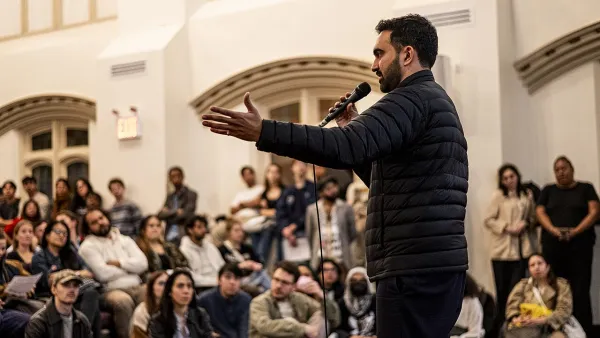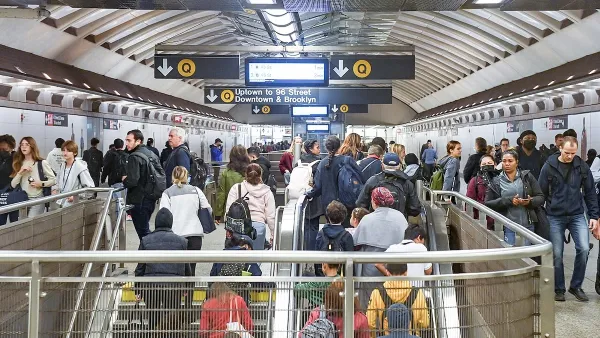This morning, Mayor Mike Bloomberg unveiled New York City's long-awaited Big Apps contest. Big Apps seeks to promote the Internet industry in the Big Apple (it's sponsored by the New York City Economic Development Corporation) and make local government more transparent.I've been following the evolution of open data initiatives at the municipal level for about a year now, and was really hoping that New York was going to set the bar for future efforts across the country. It doesn't. In fact it's hard to understand why some notable local tech superstars like investors Fred Wilson and John Borthwick would sign on to such a lame effort.
This morning, Mayor Mike Bloomberg unveiled New York City's long-awaited Big Apps contest. Big Apps seeks to promote the Internet industry in the Big Apple (it's sponsored by the New York City Economic Development Corporation) and make local government more transparent.
I've been following the evolution of open data initiatives at the municipal level for about a year now, and was really hoping that New York was going to set the bar for future efforts across the country. It doesn't. In fact it's hard to understand why some notable local tech superstars like investors Fred Wilson and John Borthwick would sign on to such a lame effort.
First of all, the prize structure doesn't make sense. First prize is $5,000 and dinner with Bloomie himself. No commitment to fund, adopt, promote or license the app for citywide use. People that build city apps want to engage the public and the investor community, not the city's political elite. I bet they'd rather have dinner with Andrew Raisej.
Second, despite the fact that the project is primarily aimed at stimulating new business development (it's coming from the econ dev folks) the rules require all entrants to grant the city a one-year license to distribute the app freely. So anyone thinking of building a paid iPhone app, you're shit out of luck.
Finally, and most importantly, the NYC Data Mine that is supposed to be the raw materials for these apps, is more of an NYC Data Dump than anything else. Browsing through the 100+ datasets posted this afternoon to the city's site, you see that about half are just boundary shapefiles easily downloaded or licensed through existing channels. The other half are a dog's breakfast of static datasets (New! Updated monthly!) in every format from Excel to Access to (gag!) SAS. Hello, people, its 2009. API+XML FTW! Just to take one example, I can't wait to see what fascinating mashups stem from the historic release of the Department of Consumer Affairs' list of licensed electronic shops. Because what the world is really lacking is more information about the location of electronics retailers. What this Data Dump looks like is the collected attachments received in reponse to the poor bureaucrat who had to twist every department's arms for one dataset, so the city could say every department contributed.
As someone who's spent time brainstorming with government agencies about open data ecosystems, I'm saddened to see that the city has engineered this program for maximum political impact, minimal risk and mediocre innovation. It's municipal vaporware.
p.s. Guys, you forgot to the the website URL in your press release. p.p.s The one cool thing they did was used Challenge Post to host the site. Thanks BetaWorks!

Maui's Vacation Rental Debate Turns Ugly
Verbal attacks, misinformation campaigns and fistfights plague a high-stakes debate to convert thousands of vacation rentals into long-term housing.

Planetizen Federal Action Tracker
A weekly monitor of how Trump’s orders and actions are impacting planners and planning in America.

San Francisco Suspends Traffic Calming Amidst Record Deaths
Citing “a challenging fiscal landscape,” the city will cease the program on the heels of 42 traffic deaths, including 24 pedestrians.

Defunct Pittsburgh Power Plant to Become Residential Tower
A decommissioned steam heat plant will be redeveloped into almost 100 affordable housing units.

Trump Prompts Restructuring of Transportation Research Board in “Unprecedented Overreach”
The TRB has eliminated more than half of its committees including those focused on climate, equity, and cities.

Amtrak Rolls Out New Orleans to Alabama “Mardi Gras” Train
The new service will operate morning and evening departures between Mobile and New Orleans.
Urban Design for Planners 1: Software Tools
This six-course series explores essential urban design concepts using open source software and equips planners with the tools they need to participate fully in the urban design process.
Planning for Universal Design
Learn the tools for implementing Universal Design in planning regulations.
Heyer Gruel & Associates PA
JM Goldson LLC
Custer County Colorado
City of Camden Redevelopment Agency
City of Astoria
Transportation Research & Education Center (TREC) at Portland State University
Jefferson Parish Government
Camden Redevelopment Agency
City of Claremont






























